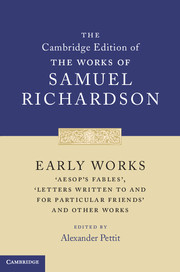Book contents
- Frontmatter
- Dedication
- Contents
- General Editors’ Preface
- Acknowledgements
- Chronology
- List of Abbreviations
- General Introduction
- Textual Introduction
- The Apprentice’s Vade Mecum (1733)
- A Seasonable Examination of the Pleas and Pretensions (1735)
- Preface to Aubin, A Collection of Entertaining Histories and Novels (1739)
- Aesop’s Fables (1739)
- Letters Written to and for Particular Friends (1741)
- Six Original Letters Upon Duelling (1765)
- Appendix: The Infidel Convicted (1731)
- Postscript
- Emendations
- Word-division
- Bibliographical Descriptions of Early Editions
- Explanatory Notes
- Index
Textual Introduction
Published online by Cambridge University Press: 30 June 2022
- Frontmatter
- Dedication
- Contents
- General Editors’ Preface
- Acknowledgements
- Chronology
- List of Abbreviations
- General Introduction
- Textual Introduction
- The Apprentice’s Vade Mecum (1733)
- A Seasonable Examination of the Pleas and Pretensions (1735)
- Preface to Aubin, A Collection of Entertaining Histories and Novels (1739)
- Aesop’s Fables (1739)
- Letters Written to and for Particular Friends (1741)
- Six Original Letters Upon Duelling (1765)
- Appendix: The Infidel Convicted (1731)
- Postscript
- Emendations
- Word-division
- Bibliographical Descriptions of Early Editions
- Explanatory Notes
- Index
Summary
In keeping with the usual practice of the Cambridge Edition of the Works of Samuel Richardson, first editions have been used as copy-texts for all works in this collection. The practice is uncontroversial in the case of Richardson's early works, most of which appeared in only one edition during the author's lifetime. Indeed, of the works here assembled, only two appeared in more than one London edition before 1761: the adaptation of Sir Roger L’Estrange's Aesop's Fables (1740, 1749, 1753a, 1753b(?)) and Letters Written to and for Particular Friends (1741, 1742, 1746, 1750, 1752a, 1752b, 1755). Dublin editions of The Apprentice's Vade Mecum (1734) and Letters Written to and for Particular Friends (1741) appeared shortly after the first London editions. All editions known to have appeared during Richardson's lifetime are described below in Bibliographical Description of Early Editions; the first edition copies described are in all cases the copies on which the present texts are based.
Posthumous editions are few and have not been described or consulted for editorial purposes. These editions, and facsimile reprints of The Apprentice's Vade Mecum, A Seasonable Examination of the Pleas and Pretensions, and Aesop's Fables, are noticed above in the General Introduction, along with fuller discussions of some of the editions published during Richardson's lifetime.
There is no reason to believe that Richardson was involved in either of the two Dublin editions. Only Aesop's Fables and Letters Written to and for Particular Friends, therefore, require consideration with respect to the Cambridge Edition's preference for first edition copy-texts. The arguments for and against favouring first editions are by now well known. Editions that record an author's final intentions for his or her work retain the advantage of doing precisely that. But in many cases, they retain the disadvantage of recording an author's revisions at a time remote from the one during which he or she was most engaged with the work. First editions remain valuable records of an author's earlier intentions for a work and, according to Jerome J. McGann's durable thesis, of the collaborative moment when ‘the artist's work begins to engage with social structures and functions’ – for example printers and printing – intrinsic to publication.
- Type
- Chapter
- Information
- Early Works'Aesop's Fables', 'Letters Written to and for Particular Friends' and Other Works, pp. xcv - civPublisher: Cambridge University PressPrint publication year: 2011

